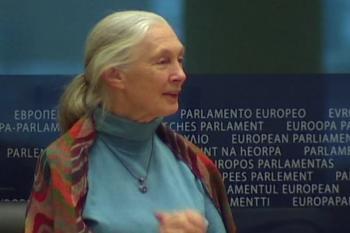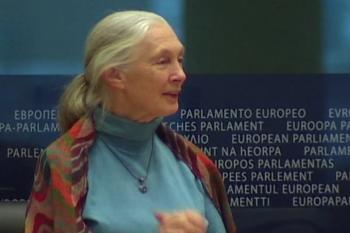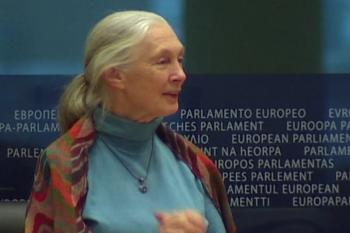BRUSSELS—The world’s most famous primatologist, Jane Goodall, visited the European Parliament in Brussels this week to speak with children of 37 nationalities about chimpanzees, the urgency of environmental protection, and making provisions for the future.
Goodall, who is best known for her nearly 50 years of studying chimpanzees in Gombe Stream National Park, Tanzania, gave a half-hour speech to an audience of 340 school children and teachers from schools in Brussels on Nov. 22. She opened her talk by greeting the kids with a “hello” in chimpanzees, and closed by giving a chance to the students to ask her questions.
One 9-year-old asked, “How did you protect yourself in the jungle? And if snakes came, what did you do?”
“I suppose they thought I was a brunch, but then at a certain point, what’s really strange, they meet your eye, and they realize you are not a brunch,” answered Goodall.
A question raised by another child was, “When you were alone in the jungle, did you have anyone to cheer you up?” To which the Goodall replied, “When I was out in the jungle, or the forest, I didn’t really need anyone to cheer me up, I would meet the chimpanzees from time to time.”
Goodall spends about 300 days per year traveling the world, talking to young people about the importance of saving the planet. She started a program called Roots & Shoots for the purpose of bringing youth together to talk about how to preserve the planet’s biodiversity for the future.
Goodall, who is best known for her nearly 50 years of studying chimpanzees in Gombe Stream National Park, Tanzania, gave a half-hour speech to an audience of 340 school children and teachers from schools in Brussels on Nov. 22. She opened her talk by greeting the kids with a “hello” in chimpanzees, and closed by giving a chance to the students to ask her questions.
One 9-year-old asked, “How did you protect yourself in the jungle? And if snakes came, what did you do?”
“I suppose they thought I was a brunch, but then at a certain point, what’s really strange, they meet your eye, and they realize you are not a brunch,” answered Goodall.
A question raised by another child was, “When you were alone in the jungle, did you have anyone to cheer you up?” To which the Goodall replied, “When I was out in the jungle, or the forest, I didn’t really need anyone to cheer me up, I would meet the chimpanzees from time to time.”
Goodall spends about 300 days per year traveling the world, talking to young people about the importance of saving the planet. She started a program called Roots & Shoots for the purpose of bringing youth together to talk about how to preserve the planet’s biodiversity for the future.



